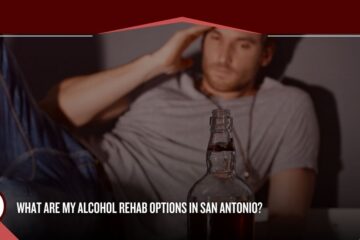Xanax is the brand name for a prescription benzodiazepine called alprazolam. Doctors usually prescribe it to treat anxiety disorders and panic attacks.[1] While Xanax is effective for short-term use, using it long-term or taking higher doses than you are prescribed can lead to addiction.
According to research on benzodiazepine misuse, 17.2% of people using medications like Xanax were abusing them.[2]
If you are addicted to Xanax, you must seek help from a professional rehab program. While being nervous about attending addiction treatment is normal, knowing how it works can make you feel more comfortable. During Xanax addiction treatment in San Antonio, you will receive a variety of services, including medically supervised detox, individual and group therapy sessions, relapse prevention planning, and aftercare.
What you will learn:
- How treatment for Xanax addiction in San Antonio works
- What to expect during rehab
- Why medical detox, therapy, and relapse prevention are important for recovery from Xanax addiction
How Does Xanax Addiction Treatment in San Antonio Work?
Addiction treatment programs in San Antonio, Texas offer a supportive environment for you to recover from Xanax. You will have access to a variety of evidence-based treatment services, a healthy support system, and healthcare professionals who specialize in treating substance use disorders.
Assessment
The first step in a Xanax addiction treatment program is an in-depth assessment. The staff members will ask you questions about your physical and mental health as well as your history of Xanax abuse. The information gathered will be used to create an individualized treatment plan, which means all of the services you participate in will be based on your needs.
Your treatment plan might include whether you need detox services, how long you should spend in rehab, and if you require treatment for co-occurring mental health conditions.
Medical Detox
Once you have completed your assessment, you will begin Xanax detox. Since the symptoms of Xanax withdrawal can include effects like anxiety, tremors, heart palpitations, and seizures, you will receive medications to help you remain stable.[3]
More often than not, your doctor will prescribe another benzodiazepine to control your symptoms. Your dose will be slowly tapered until your body is no longer dependent on Xanax. Tapering prevents severe symptoms of withdrawal, ensuring your safety and comfort.
In addition to medication, you will receive medical assistance from licensed nurses and medical staff. If your blood pressure is too high or you are experiencing a fever, you will be promptly treated.
Evidence-Based Therapies
After you overcome withdrawal, you will begin recovering from the emotional and behavioral aspects of Xanax addiction. Xanax rehab centers in San Antonio use evidence-based therapies on both an individual and group basis.
Examples of evidence-based therapies for substance use disorders include:[4]
- Cognitive behavioral therapy (CBT)
- Motivational interviewing (MI)
- Contingency management (CM)
- 12-step facilitation therapy
- Family therapy
Therapy is used to address the root causes of your Xanax addiction and teach healthy coping skills. If you suffer from co-occurring mental health conditions, therapy can also help you manage your symptoms.
Medication Management
Many people become addicted to Xanax after they begin taking it for an anxiety disorder. If this is how you developed your addiction, your rehab program will help you find an alternative treatment for your anxiety. Several types of anxiety medications are highly effective without putting you at risk of developing a substance use disorder.
Xanax rehab programs in San Antonio might prescribe the following medications to treat anxiety:
- Selective serotonin reuptake inhibitors (SSRIs)
- Serotonin and norepinephrine reuptake inhibitors (SNRIs)
- Beta-blockers
- Antihistamines
- Buspirone (Buspar)
Relapse Prevention and Aftercare
Once you have successfully completed therapy and gotten stabilized on an anxiety medication, it’s time to begin developing relapse prevention strategies. This involves identifying your triggers and learning healthy coping mechanisms to replace substance abuse.
Another key part of relapse prevention is aftercare, which are services provided by your rehab program after you complete treatment. Examples of aftercare services include:
- Continued therapy
- Medication management
- Access to an alumni support group
- Referrals to outpatient or sober living programs
- Recommendations on local support groups
- Case management services like vocational training
Aftercare provides you with ongoing support once you are tackling sobriety independently. It keeps you connected with your recovery program, making you less likely to relapse.
Find Treatment for Xanax Addiction in San Antonio
If you or a loved one suffers from Xanax addiction, it’s time to seek professional help. Our Xanax rehab center offers the tools and support you need to be successful in recovery. From our detox program to evidence-based therapies and relapse prevention, we will help you achieve long-term sobriety.
At Alamo Behavioral Health, we believe that quality care begins with a compassionate community. Within our drug and alcohol rehab center in San Antonio, you’ll find a welcoming environment where individuals from all walks of life come together to support one another on their path to recovery. Our team of experienced professionals is dedicated to providing personalized care tailored to meet each individual’s unique needs.
Contact Alamo Behavioral Health today to learn more about our Xanax addiction treatment center in San Antonio.
References:
- Statpearls.com: Alprazolam
- Psychiatryonline.com: Benzodiazepine Use and Misuse Among Adults in the United States
- Uptodate.com: Benzodiazepine withdrawal
- The National Library of Medicine (NLM): Evidence-based practices for substance use disorders







